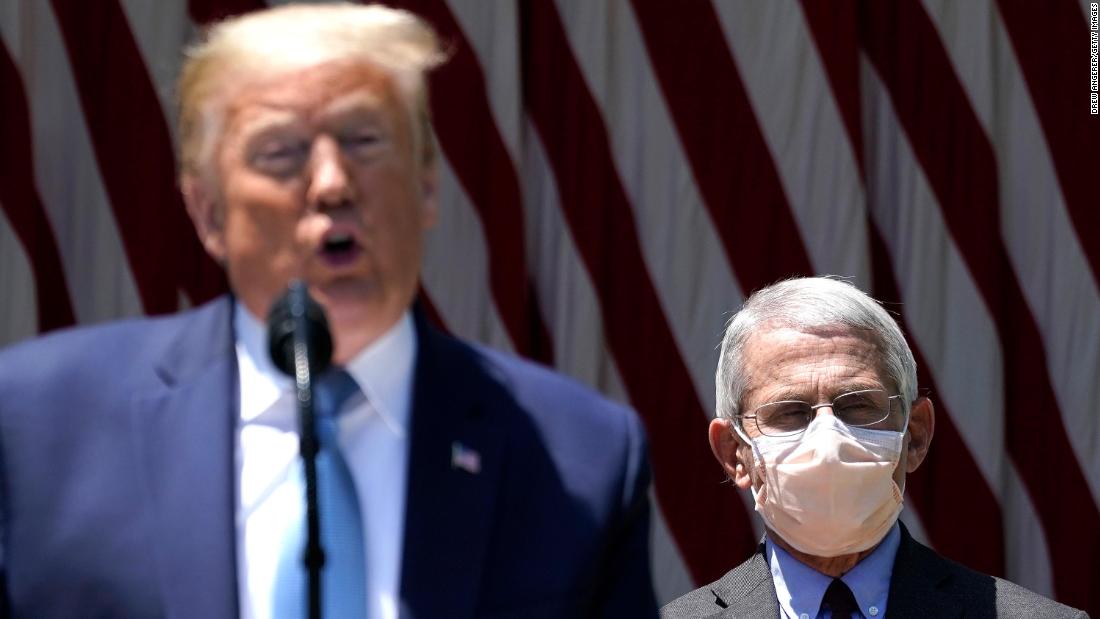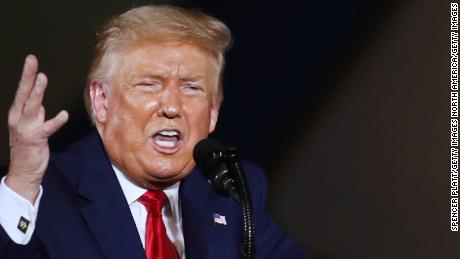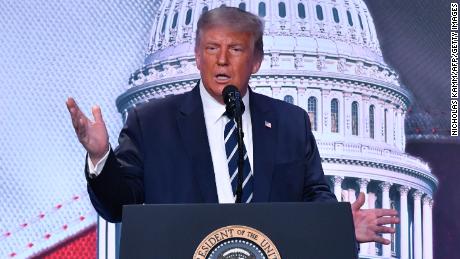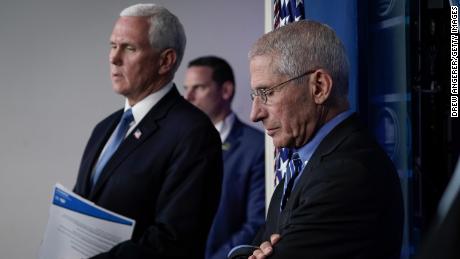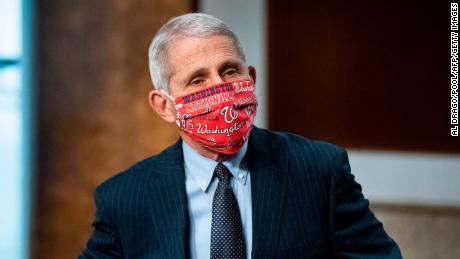As a newcomer adviser eclipses Dr. Fauci in influence, the President and his aides are resigned to the virus’ inevitable spread
Internal struggles among the medical advisers have divided the White House for weeks, with advisers like Fauci and other members of the task force pushing a forward-leaning stance on coronavirus against resistance from the top down. Now, with two months to go until the election, the White House is focused on reopening the economy and mitigating the virus to a limited extent, or just enough to keep hospitals from being completely overwhelmed.
The internal goal is to keep things just under control until a vaccine comes out, two senior administration officials said.
“You can’t stop it!” one senior official said of the internal thinking on the virus.
The President and his White House chief of staff Mark Meadows have increasingly turned to Atlas, a contrarian doctor whose expertise lies in free-market health care and economic policy rather than epidemiology. Atlas, a fellow at Stanford University’s Hoover Institution, joined the White House after he caught Trump’s eye with appearances on Fox News.
Atlas speaks with Trump almost daily, people familiar with the matter said, replacing the briefings he once received from medical experts like Task Force Coordinator Dr. Deborah Birx. And in meetings, Atlas has been unguarded in using his access to Trump to convey what he says are the President’s wishes on the coronavirus response, including reopening efforts and advances in treatments.

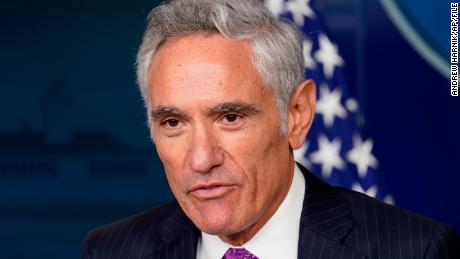
Scott Atlas, senior fellow at the Hoover Institution
Atlas has rejected the need for widespread community testing, arguing that the administration should focus almost exclusively on protecting and testing elderly populations while pushing for the rest of the economy to return to normal, this official said.
“Everything he says and does points toward herd immunity,” the senior administration official said.
Those views have caused clashes between Atlas and medical experts, namely Birx, with whom Atlas has clashed several times, according to one official.
When a controversial decision was debated among task force members last month to change US Centers for Disease Control and Prevention guidelines on testing people without symptoms, Atlas sat across the Situation Room table from Birx to advocate for the move. Fauci, who expressed concern about the changes, was in surgery.
When Atlas was brought onboard, Trump had become disillusioned with the medical advice of Birx and had begun voiced skepticism about her after she praised House Speaker Nancy Pelosi in an interview, people familiar with the matter said. Two officials voiced concern that Trump was elevating Atlas specifically to diminish the voices of medical experts he disagrees with.
Several of the health professionals on the task force raised questions about Atlas when he came on board, asking each other who he was and what his role would be. After months of weathering both the pandemic and Trump’s mercurial moods, his arrival threw further complication into Fauci and Birx’s efforts to champion a science-based response inside the White House.
Fauci and Birx initially sought to better understand Atlas’s views and to potentially include him in a sub-task force of doctors who regularly discuss the coronavirus response, according to people familiar with the matter. But it was clear soon after Atlas started that his views did not align with the other medical professionals at the White House, and that his influence was far greater than some had expected.
Trump’s pivot to law and order
As his White House moves away from heavy-handed action to contain the virus, Trump is talking less and less about the virus in public, and when he does, it has been to elevate misinformation and conspiracy theories.
Trump, who officials say rarely attends meetings devoted solely to the coronavirus, has elevated conspiracies about the Covid death toll while turning his attention to “law and order” issues, hoping to make nationwide civic unrest a centerpiece of his reelection effort instead of how he’s handled the pandemic.
The President’s political advisers now largely believe it will be difficult to change Americans’ negative perceptions of how the President handled coronavirus and are hopeful other issues like civic unrest eclipse the pandemic over the next two months.
Instead of searching for ways to further mitigate the spread, Trump has set his sights on a vaccine as a political game-changer, even though health experts say it’s unrealistic to expect a safe and effective one by November.
On Monday, the ramifications of the administration’s handling of the coronavirus pandemic came into sharper relief. Even amid signs that infections are slowing, the US passed the 6 million mark for cases. Nearly 183,000 Americans have died.
Yet as he conducted one of the press briefings he resumed in July to demonstrate pandemic leadership, Trump spent a cursory few minutes addressing the crisis before moving on to lengthy and rambling attacks on his rival Joe Biden for not being tough enough on violence.
And the President is continuing to publicly dismiss Fauci’s expertise. Asked in an interview on Fox News whether he would assign Fauci to his coronavirus task force if given an opportunity to do it over, Trump demurred.
“I disagree with a lot of what he said,” he told interviewer Laura Ingraham, who has been a detractor of Fauci’s. “I get along with him, but every once in a while he’ll come up with one that I say, where did that come from? I inherited him. He was here.”
Fauci, speaking the morning after, said on ABC News he believes Trump trusts him and the advice he delivers.
“I think that’s kind of a distraction to pit me against the President,” Fauci said. “We’re all on the same team.”
Echoing Trump’s beliefs
The team is increasingly being driven by Atlas’s views. But those views are not new inside the White House.
The White House was already doggedly focused on reopening the economy and protecting vulnerable populations — while encouraging the young and healthy to go about their lives — before Atlas joined the administration. Meadows, the White House chief of staff, and Marc Short, the vice president’s chief of staff, have both emphasized an economy-first approach to the coronavirus.
But while Atlas has no expertise in epidemiology or infectious disease, his presence — and the M.D. behind his name — is an attempt to lend more credibility to ideas that are overwhelmingly opposed by the public health community.
Atlas and other administration officials have placed an especially heavy emphasis on testing in nursing homes while rejecting the need for widespread testing in the broader community, which epidemiologists say is a mistake. Vulnerable populations don’t just live in nursing homes and spread of the virus elsewhere can ultimately lead to elderly people and other vulnerable populations getting infected.
Atlas has also bought into the unsubstantiated belief that children are not infected and cannot spread the virus as much as adults, this official said.
But the White House seems determined to put Atlas on level footing with the administration’s other medical experts. That was on display Monday as Atlas joined Florida Gov. Ron DeSantis for a news conference, a move that mirrored Birx’s public-facing role, traveling across the country and joining state and local officials.
“We have to recognize the harms of removing someone from society, of a so-called prolonged lockdown. They are extraordinary, and the role of public policy is not just to eliminate Covid-19 infection at all cost,” Atlas said. “That is not the correct policy. It never really was the policy. The policy is really to consider what the impact of the lockdown, what the actions of the policy, are.”
Halfway across the country, Birx continued to hammer home the importance of mitigation measures, urging Americans to take personal responsibility during an event in Minnesota.
“Right now, we gain freedom through wearing our masks and socially distancing,” she said.
Amid the White House’s increasingly polarized and politicized response, the Food and Drug Administration, which has long positioned itself as an apolitical arbiter of science and data, has also increasingly found itself caught in the middle
With Trump increasingly intent on finding and highlighting administration success stories amid accusations he bungled the federal response, the agency and its administrator Dr. Stephen Hahn have found themselves in Trump’s sights as hampering efforts to project optimism.
The ‘deep state’
Trump, who officials say has been egged on by his hawkish trade adviser Peter Navarro, has deemed the agency’s scientists and career members of the “deep state” who are determined to damage him politically.
Concerned the FDA was being overly cautious in its public messaging, the White House two weeks ago installed a conservative operative and pundit, Emily Miller, as its chief spokesperson. The move, which came as a surprise to many inside the FDA, was viewed by some career employees as an attempt to exert more political control over the administration’s health efforts.
Trump had previously complained bitterly to aides about some of the FDA’s actions during the pandemic, namely its reversal of authorization for hydroxychloroquine, the anti-malarial that is not proven to treat coronavirus. Inside the West Wing, some officials have claimed that scientists working at the FDA and the National Institutes of Health are actively working to stymie Trump’s efforts toward developing treatments and a vaccine in order to diminish his chances of reelection.
That view has also taken hold with Trump, who in public and private has claimed the FDA and other government agencies will only announce a vaccine for coronavirus after the election.
A series of phone calls between the White House and FDA leadership two weeks ago led to the outsized announcement of an emergency use authorization for convalescent plasma, which some other administration health officials — including Fauci and his boss at the NIH, Dr. Francis Collins — had raised concerns about.
But nearly as soon as Trump and Hahn had delivered the announcement during a much-heralded Sunday briefing from the White House, questions began to emerge about their claims of efficacy. Hahn ultimately apologized for mischaracterizing how effective plasma treatment is known to be, and the fiasco seemed to precipitate Miller’s removal from the top spokesman role two weeks after assuming it.
Still, Hahn has not shied away from his aggressive approach to quickly developing an available vaccine. He told the Financial Times on Monday he could could consider authorization for a Covid-19 vaccine before Phase 3 trials are over.
The pull of the FDA into Trump’s political orbit has led to concerns among medical experts that an eventual vaccine will be viewed skeptically by Americans if they believe it was rushed.
“The problem is both with hydroxychloroquine and with the convalescent plasma, we saw a real politicization of that scientific debate in a way that I think has all of us concerned,” said Dr. Ashish Jha, director of the Harvard Global Health Institute. “So what I’d like is for the science to drive this decision, for it to be very transparent, and for political leaders to not get involved in deciding when a medicine or a vaccine is safe or not.”
![]()


